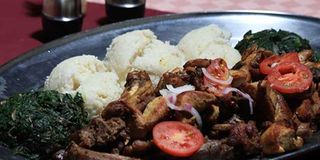Maize millers meet in Nakuru to discuss ugali nutrition

Ugali served with fried chicken. Maize millers from Nyanza, western and Rift Valley regions are meeting in Nakuru town to discuss the fortification of maize flour before it is sold to consumers. PHOTO | JOSEPH KANYI | NATION MEDIA GROUP
What you need to know:
- A new study by JKUAT indicates that nearly half of the maize millers in Kenya do not add essential minerals.
- The process, technically known as flour fortification or enrichment, is a legal requirement in Kenya.
- Majority of Kenyans are still consuming flour without the essential micronutrients, exposing them to deficiencies.
Maize millers drawn from Nyanza, western and Rift Valley regions are meeting in Nakuru town to discuss the fortification of maize flour before it is sold to consumers.
The event organized by the Jomo Kenyatta University of Agriculture and Technology (JKUAT) in collaboration with the Ministry of Health aims to assist millers produce safe and nutritious products in order to safeguard health of all consumers.
A new study by JKUAT indicates that nearly half of the maize millers in Kenya do not add essential minerals and vitamins to their flour products.
The process, technically known as flour fortification or enrichment, is a legal requirement in Kenya.
The country has prioritised fortification of salt, maize and wheat flour, as well as fats and oils.
SMALL SCALE MILLERS
According to the study findings, while all large scale millers were found to be fortifying their products, only 46 percent of medium scale millers fortify their products.
The situation is worse among small scale millers where only 24 percent reported adding the mandatory micronutrients to the flours.
It is estimated that up to 70 percent of packaged maize flour consumed in most urban areas of Kenya is produced by large scale millers.
The situation is directly the opposite in rural areas and urban slums where most of the flour is either unpackaged or sourced from small and medium scale millers.
This means that majority of Kenyans are still consuming flour without the essential micronutrients, exposing them to deficiencies.
The World Health Organisation recommends that maize flour and corn meal be fortified with iron to prevent iron deficiency especially among vulnerable groups like women and children.




